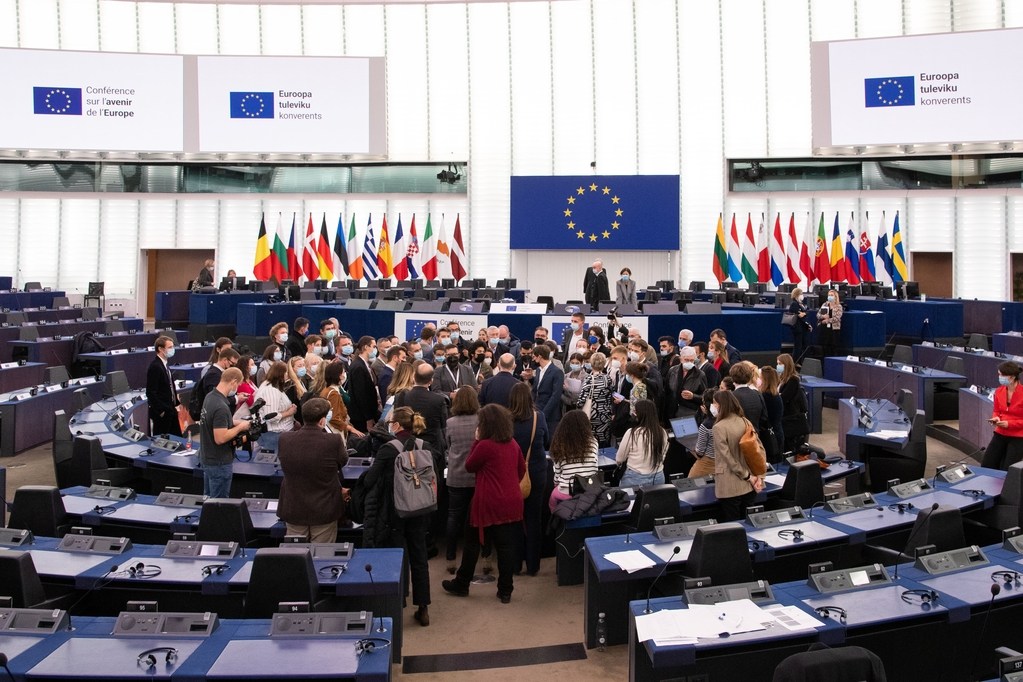The second Plenary of the Conference took place on Saturday in the European Parliament in Strasbourg and discussed the contributions from the previous citizens’ panels.
Each of the four panels consisted of 200 ordinary citizens that had been randomly selected from all EU member states to represent the diversity of EU. The proceedings, proposals and ideas from the panels are described in separate reports available on the internet. In addition, two interim reports have been published, the second one covering the contributions on the digital platform until 7 September 2021.
They covered a wide range of topics, starting with “a stronger economy, social justice, jobs/education, youth, culture, and sport/digital transformation” (17 – 19 September) and continued with “European democracy/values and rights, rule of law, security” (24-26 September), “Climate change, environment/health” (1-3 October), and “EU in the world/migration” (15-17 October).
Furthermore, there have also been over 3,180 other events across the EU that have brought together over 140,000 participants, according to the Commission.
Francesco Indiveri, 29, an Italian lawyer from Naples who participated in the fourth panel, told The Brussels Times that it was important to combat populist misinformation about the EU and EU funding. “I would like to see this initiative repeated in each EU country and in each national parliament, so that our voices will be raised and heard also in the national and local context.”
At the Plenary on Saturday, 80 representatives of the Citizens' Panels took their seats, joined by 27 more citizens (one from each member state), representing national events or national citizens' panels. Representatives of the social partners (12) and civil society (8) participated also at the plenary.
The majority of delegates at the plenary consisted of representatives from the European institutions – the European Parliament (108), the Council (54, or two per member state) and the European Commission (3) – and representatives from all national Parliaments (108).
However, despite the dominance of politicians, Dubravka Suica, Vice-President of the European Commission and co-chair of the conference, described it as “A historic moment where, for the first time, citizens deliberate on a par with their elected representatives at all levels. Bringing citizens to the core of European policymaking will reinforce our representative democracies.”
For the first time, representatives from the Western Balkans participated as key partners. This was the first Plenary under the Slovenian Presidency of the Council and its conference co-chair Gašper Dovžan said that he was pleased to welcome them “as key stakeholders with whom we share responsibility for the future of the EU.”
In his opening speech, he promised that the citizens would get more speaking time than any of the EU institutions, even taken together.
“The enthusiasm in the Citizens' Panels is great, expectations are high, the formula is working,” commented Guy Verhofstadt (European Parliament), one of the co-chairs of the Conference. “Now the Plenary has to find answers to the issues raised, in the form of a shared vision of Europe's future and concrete deliverables on how we reform the EU.”
Overall, civil society organisations were satisfied with the Plenary. "The Conference on the Future of Europe is a great and very positive experiment,” commented Bent Norby Bonde, Secretary General of Europe’s Peoples Forum. “We should celebrate the positive outcomes and we should also also be ready to learn lessons for the future.”
His organisation would like to see an even stronger coherence in the methodology that is used to engage citizens in the conference. ”We must take care to have as many and representative citizens as possible to take part in the policy discussions that will follow in the months and years to come.”
“What is important now is to widen access to the conference and bring in new voices, particularly those of citizens and non-citizens who are not used to talking about Europe,” added Roger Casale, Secretary General of New Europeans. “That means that we in civil society need to resist the temptation to see the conference as a lobbying opportunity for our particular concerns.”
The next Conference Plenary will take place on 17-18 December. In the meantime, citizens' contributions to the Conference will continue to flow in. The Multilingual Digital Platform remains available for citizens' ideas and events. The European Citizens' Panels will meet online and finalise their recommendations. National panels and events are still being organised in the member states.
M. Apelblat
The Brussels Times

